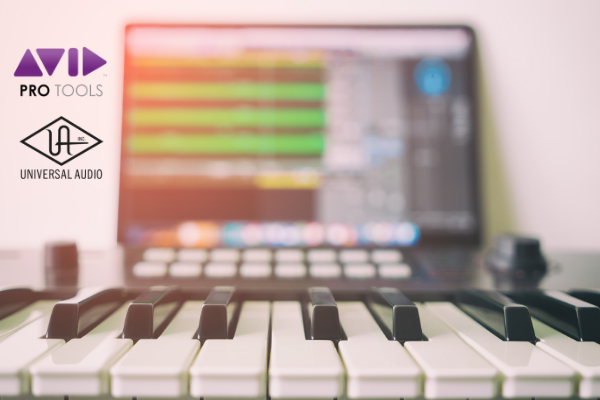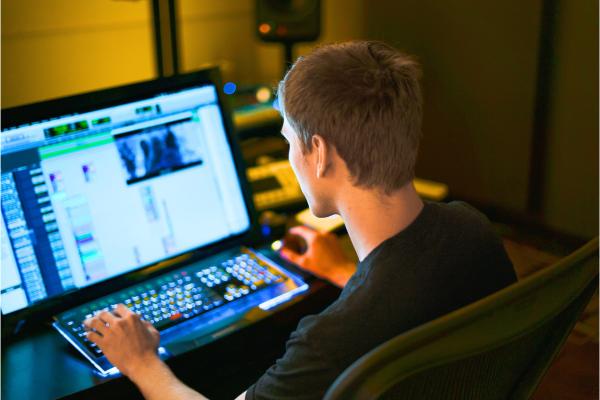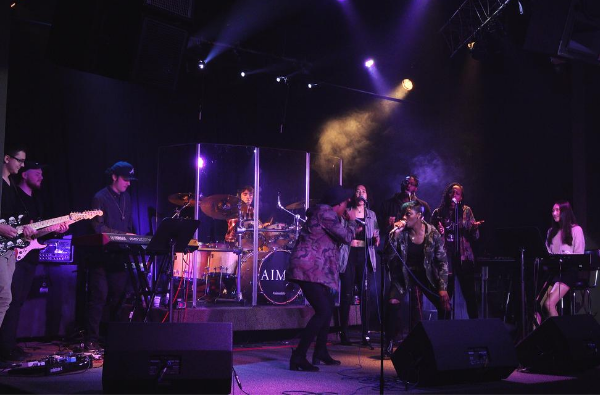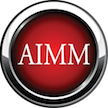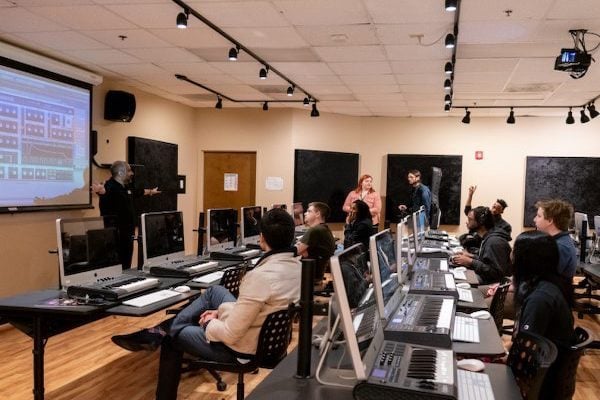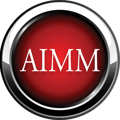Online Certificate in Music and Technology With a Focus On Guitar

Online Guitar Certificate: A Comprehensive Overview
AIMMs Online Guitar Certificate program, the Online Music and Technology Certificate with a Focus on Guitar, consists of 36 credits. All 36 credits are fully transferable to the Associate of Applied Science in Music and Technology Degree.
This guitar certificate online program is 100% online and contains courses that provide students with the necessary education to further their musical, recording, and engineering abilities.
If you’re looking to push your technical skills to the next level through intricately designed courses, AIMM’s Online Guitar Certificate is for you.
The comprehensive program is designed for the intermediate guitarist who wants to gain in-depth knowledge in the field of recording and engineering. This is essential to finding opportunities in today’s ever-changing music industry.
We believe in developing well-rounded musicians, giving them a solid foundation in various musical styles. This allows students to dive further into an instrument they love, like the electric guitar or acoustic guitar, without the commitment of an Associate Degree Program.
If this seems like something you may be interested in, the Online Music and Technology Certificate with a Focus on Guitar is the right choice for you!
Click here to view our E-Brochure.
Online Guitar Student Success Timeline

The curriculum is designed to provide the intermediate player with the necessary education to further his or her abilities. It facilitates the student’s ability to gain employment in the field, especially if experience playing the guitar and knowing the basics of guitar playing is required.
The Online Guitar Certificate in Music and Technology consists of 36 credits fully transferable to the 94-credit Associate of Applied Science in Music and Technology Degree. Our guitar certificate online program can also be taken in person. It contains courses designed to provide students with the necessary education to further their musical, recording, and sound engineering abilities.
The program is designed to create opportunities in today’s ever-changing music industry.
The program can be completed in 9 months (3 quarters) of full-time enrollment, 12 months (4 quarters) of ¾ time, or 18 months (6 quarters) of ½ time enrollment.
Students in good standing will have the option to take AVID Pro Tools Certification Exams upon course completion.
Students in the Certificate in Music and Technology program are not required to complete General Education courses, except for SCI120 Physics of Sound. Students must show proficiency in their instrument of concentration, be it electric guitar, acoustic guitar, or classical guitar, as described in the Admissions procedures.
Career Opportunities with an Online Guitar Certificate
Upon completion of online guitar certificate programs, graduates will have a wide range of career opportunities in the music industry. From becoming session guitarists and music producers to becoming music industry professionals, the foundation of knowledge gained from this program is invaluable.
The job market for individuals with a certificate in guitar is promising. With the modern sound of today's music incorporating a melodic range of contemporary styles, there's a demand for skilled guitarists with a foundation in guitar techniques and knowledge.
Whether you're interested in teaching lessons in guitar, performing your favorite songs live, or working behind the scenes in production, this certificate opens many doors.
AIMM also offers an online program for bass guitar, catering to those who wish to delve into the lower melodic range of music.
Program Features
- Courses 31
- Credit Hours 36 hours
- Skill level Intermediate
- Language English
- Currently Enrolling Yes
Certificate in Music and Technology
with a Concentration in Guitar, Bass, Drums, Keyboard, or Voice
| Course Number | Course Title | Credits | |
| RCD140* | Introduction to Audio Production I* This course gives the student an introduction to, and a strong foundation in, audio production techniques, including an introduction to analog recording history, physical properties of sound, basic microphone types, recording environments, mono & stereo microphone techniques as well as basic analog signal flow & analog signal processing including equalization and dynamic processing techniques. |
3 | |
| RCD240* | Introduction to Audio Production II* This course gives the student a more advanced introduction and foundation to audio production techniques including principles of analog & digital audio production and recording and data storage and playback media for digital audio formats. The student will gain an advanced understanding of large format analog console signal flow, time-based processors and an introduction to plug-in processing. Prerequisite: RCD140 Introduction to Audio Production I |
3 | |
| RCD130* | MIDI: Synthesis & Sequencing* This course is an introduction to the MIDI language, using Ableton Live and Native Instrument’s Komplete Bundle as the vessel of instruction. This course demonstrates core concepts such as the basic MIDI environment, sequencing, sampled-based and synthesis instruments, automation, and final steps for MIDI-based production including mixing and effects processing. |
4 | |
| INT495* | Music Business* Presenting concepts and practices that cover several areas of the constantly changing music industry. Students will learn about such things as booking, agency contacts, performing rights organizations, copyright and trademark, record label anatomy, artist management agreements, tax information, resume and self-promotion. |
1 | |
| INT145* | Music Theory Essentials I* This class covers the basic elements of music theory, ear training and notation. Diatonic harmony, major and minor key signatures, triads and 7th chords, scale harmonization, meters, basic rhythmic notation, and chord symbol conventions. Students will practice recognizing fundamental musical elements by ear. Basic keyboard skills will be covered including chords, scales and reading. |
3 | |
| INT245* | Music Theory Essentials II* This class focuses on scales, modes and linear structures needed for improvisation and melody. Ear training and dictation of melody and diatonic chord progressions are covered. Advanced notation concepts including form, articulation and syncopated rhythm are included. Harmonic concepts are practiced and reinforced using keyboard. Prerequisite: INT145 Music Theory Essentials I |
3 | |
| INT100* | Performance I* This course is an interdisciplinary live performance class based on standard introductory level repertoire for R&B, Blues, Rock and Pop styles. Students perform on stage weekly in a live interactive ensemble format with voice and rhythm section instrumentation that emulates professional gigging scenarios. The emphasis is on execution of melody, rhythm, chords, form, and improvisation. Materials such as sheet music, charts, play along tracks, lyrics, video tutorials are provided via Canvas Learning Management System. |
4 | |
| INT200* | Performance II* This course is an interdisciplinary live performance class based on standard intermediate level repertoire for R&B, Blues, Rock and Pop styles. Students perform on stage weekly in a live interactive ensemble format with voice and rhythm section instrumentation that emulates professional gigging scenarios. The emphasis is on execution of melody, rhythm, chords, form, and improvisation. Materials such as sheet music, charts, play along tracks, lyrics, video tutorials are provided via Canvas Learning Management System. Prerequisite: INT100 Performance I. |
4 | |
| SCI120* | Physics of Sound* This course introduces students to the physical nature of music and sound. Waves, sound propagation, harmonic content, the human hearing mechanism and musical instrument tone production are discussed. Psychoacoustics and perception of sound are included |
3 | |
| RCD100* | Pro Tools 101* This course introduces basic principles a student needs to understand how to complete a Pro Tools project, from initial setup to final delivery, and to take the Avid Pro Tools 101 User Certification exam. Topics include purposes and uses of edit tools, modes, various track and signal clip functions for recording, editing, and importing audio, MIDI, and video used for music and media production. Included with the course textbook are media files for Pro Tools 101 exercises and hands-on projects. Students in good standing will have the opportunity to take the Avid Pro Tools 110 User Certification exam upon course completion. |
2 | |
| RCD200* | Pro Tools 110* This course builds on the introductory Pro Tools 101 course, evolving basic Pro Tools principles while providing the student with the essential processes needed to complete a Pro Tools project, from initial set up to final mixdown, and to take the Avid Pro Tools 110 User Certification exam. The course teaches intermediate Pro Tools techniques, covering key concepts and skills needed to operate a Pro Tools system. Topics include Hardware I/O setup and routing, Elastic Audio, internal Bus path usages for send/returns, automation, and more. Included with the course textbook are media files for Pro Tools 110 exercises and hands-on projects. Students in good standing will have the opportunity to take the Avid Pro Tools 110 User Certification exam upon course completion. Prerequisite: RCD100 Pro Tools 101 |
2 | |
| GTR130* | Reading I* This class focuses on two areas: rhythm reading and note reading. In the rhythm reading section, the students start with eighth note based rhythms in both straight eighth and swing eighth feels. By the end of Level I, the student will be working with complex combinations of triplet and sixteenth note figures. In the note reading section, the students start off with whole note and half note exercises that quickly advance to the complex level of rhythm reading. |
1 | |
| GTR230* | Reading II* This class takes the skills learned from the rhythm and note reading exercises covered in Level I and puts them to work on real bass charts. These bass charts were actually used on gigs. The focus is on understanding form, fingering analysis, and groove. The students will be tested on these charts each week by playing through the charts like they are on a real gig situation. Prerequisite: BAS130 Reading I |
1 | |
| GTR120* | Scales I / Technique I* Scales I begins with an exploration of currently accepted bass technique; then the major scale is explored in depth including: modes, pentatonic scale, blues scale, arpeggios, and sequences. Students are expected to play regularly, demonstrating not only knowledge of the scales, but also knowledge of how to use those scales to create music. |
1 | |
| GTR220* | Scales II / Technique II* Scales II explores the melodic minor scale in depth including: Modes, arpeggios, and sequences. The class also explores uses of symmetric scales. Students are expected to play regularly, demonstrating not only knowledge of the scales, but also knowledge of how to use those scales to create music. Prerequisite: BAS120 Scales I |
1 | |
| Certificate in Music and Technology (Online) - Total Credits | 36 | ||
To better serve our students, the curriculum is subject to change.
Back to Top

